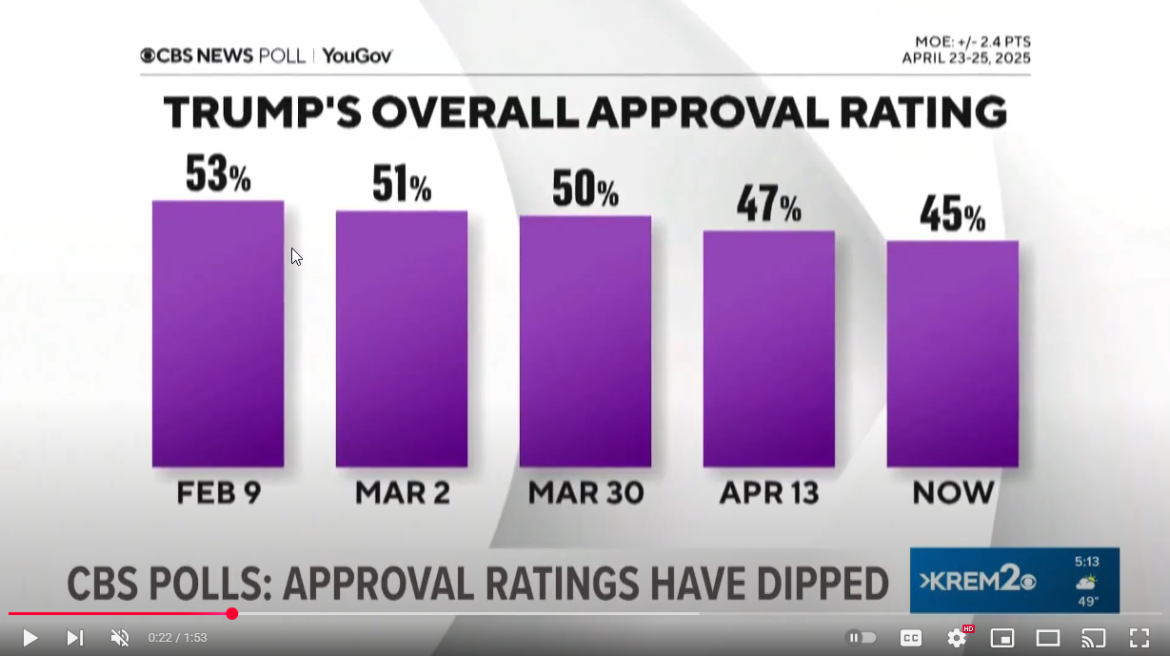As President Donald Trump approaches the 100-day mark of his first term in office, a wave of new polls shows mixed reactions from the American public. According to a recent ABC News poll, 39 percent of respondents approve of the president’s job performance, while a CBS News survey puts his approval rating slightly higher at 45 percent. Both polls indicate a decline from earlier approval numbers reported in February, signaling growing unease among voters about the administration’s trajectory.
Economic concerns appear to dominate the public’s uneasiness. With tariffs on a wide range of goods still firmly in place, more than 40 percent of respondents in both surveys say their personal financial situations have worsened since Trump took office. Consumers cite higher prices on everyday goods, instability in agricultural markets, and a sense of uncertainty about future economic growth. While a majority of respondents express worry over the economy, some remain cautiously optimistic, believing that the administration’s longer-term goals could still yield positive results.
These poll numbers surface as Trump prepares to celebrate his first major milestone in office tomorrow. Historically, a president’s 100-day performance is viewed as an early indicator of future success or struggle. While Trump has touted his administration’s achievements — including deregulation efforts, executive orders on immigration enforcement, and initial groundwork for tax reform — critics argue that legislative victories have been limited, with several campaign promises stalled in Congress.
Polling experts suggest that Trump’s approval ratings reflect a sharply polarized electorate. While support among Republican voters remains robust, independent and moderate voters appear increasingly skeptical, citing not only economic issues but also concerns over healthcare, foreign policy decisions, and the overall tone of political discourse since Trump’s inauguration.
The White House is highlighting President Trump’s immigration crackdown ahead of his 100th day back in office. During a briefing, border czar Tom Homan emphasized the administration’s aggressive enforcement efforts, including addressing concerns about U.S. citizen children removed when a parent was deported and defending the arrest of a Milwaukee judge accused of obstructing immigration enforcement, stating that “when you cross that line, you will be prosecuted, judge or not.” Homan also responded to questions about why a national emergency remains in place despite record-low border crossings. Meanwhile, White House Press Secretary Karoline Leavitt announced Trump will sign a new executive order on “Law & Order” and sanctuary cities later today and faced inquiries regarding efforts to return Kilmar Abrego Garcia to the U.S. after his mistaken deportation to El Salvador.
Back history on presidential 100-day evaluations shows that while early approval ratings are not always predictive of long-term success, they often set the tone for the political battles ahead. President Barack Obama, for example, enjoyed an approval rating above 60 percent at his 100-day mark, buoyed by efforts to stabilize the economy following the 2008 financial crisis. President George W. Bush held a similar approval rating following his first 100 days, largely supported by a national rally-around-the-president sentiment after the disputed 2000 election.
Trump’s 100-day mark comes during an era of unprecedented media scrutiny and political division, factors that analysts say have amplified public perceptions — both positive and negative. As he moves past this symbolic milestone, Trump faces critical tests, including efforts to renegotiate trade agreements, pass healthcare reform, and strengthen America’s global standing amid increasing international tensions.
The next several months will be crucial in determining whether Trump can broaden his support base beyond his loyal followers or if economic worries and political turbulence will continue to weigh down his presidency.



